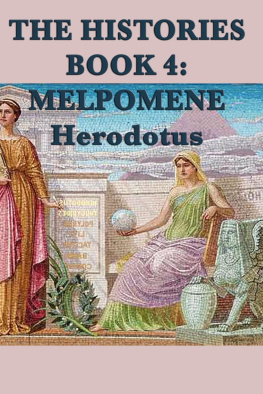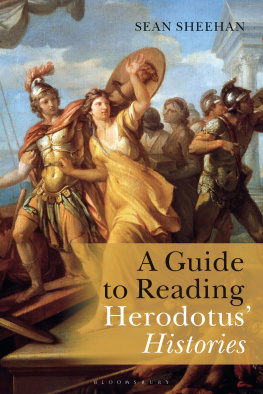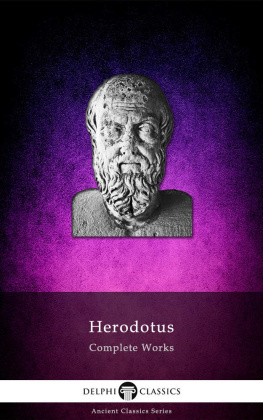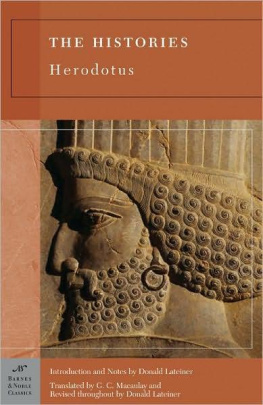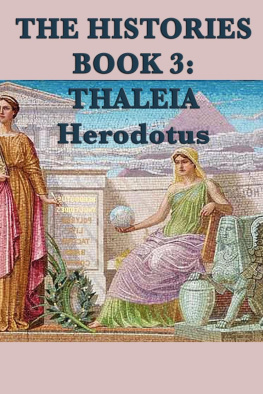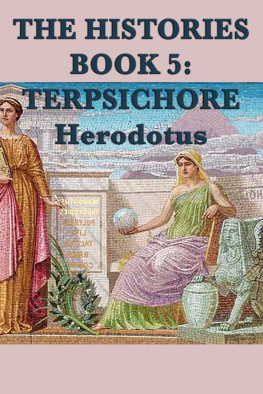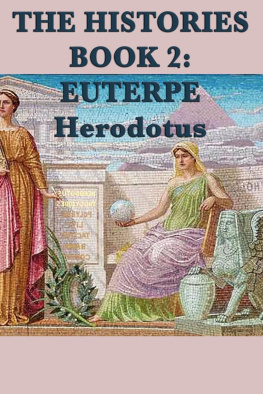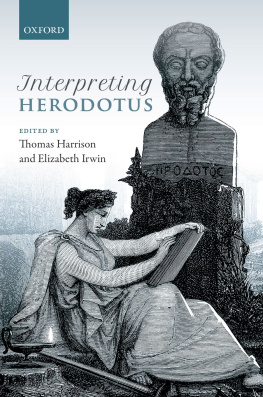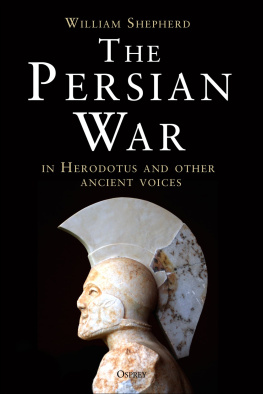Start Publishing LLC
Copyright 2012 by Start Publishing LLC
All rights reserved, including the right to reproduce this book or portions thereof in any form whatsoever.
First Start Publishing eBook edition October 2012
Start Publishing is a registered trademark of Start Publishing LLC
Manufactured in the United States of America
10 9 8 7 6 5 4 3 2 1
ISBN 978-1-62558-043-6
The Histories
Book 4: Melpomene
By Herodotus
The Histories Book 4: Melpomene
1. After Babylon had been taken, the march of Darius himself against the Scythians took place: for now that Asia was flourishing in respect of population, and large sums were being gathered in as revenue, Darius formed the desire to take vengeance upon the Scythians, because they had first invaded the Median land and had overcome in fight those who opposed them; and thus they had been the beginners of wrong. The Scythians in truth, as I have before said, had ruled over Upper Asia for eight-and-twenty years; for they had invaded Asia in their pursuit of the Cimmerians, and they had deposed the Medes from their rule, who had rule over Asia before the Scythians came. Now when the Scythians had been absent from their own land for eight-and-twenty years, as they were returning to it after that interval of time, they were met by a contest not less severe than that which they had had with the Medes, since they found an army of no mean size opposing them. For the wives of the Scythians, because their husbands were absent from them for a long time, had associated with the slaves.
2. Now the Scythians put out the eyes of all their slaves because of the milk which they drink; and they do as follows:they take blow-pipes of bone just like flutes, and these they insert into the vagina of the mare and blow with their mouths, and others milk while they blow: and they say that they do this because the veins of the mare are thus filled, being blown out, and so the udder is let down. When they had drawn the milk they pour it into wooden vessels hollowed out, and they set the blind slaves in order about the vessels and agitate the milk. Then that which comes to the top they skim off, considering it the more valuable part, whereas they esteem that which settles down to be less good than the other. For this reason the Scythians put out the eyes of all whom they catch; for they are not tillers of the soil but nomads.
3. From these their slaves then, I say, and from their wives had been born and bred up a generation of young men, who having learnt the manner of their birth set themselves to oppose the Scythians as they were returning from the Medes. And first they cut off their land by digging a broad trench extending from the Tauric mountains to the Maiotian lake, at the point where this is broadest; then afterwards when the Scythians attempted to invade the land, they took up a position against them and fought; and as they fought many times, and the Scythians were not able to get any advantage in the fighting, one of them said: What a thing is this that we are doing, Scythians! We are fighting against our own slaves, and we are not only becoming fewer in number ourselves by being slain in battle, but also we are killing them, and so we shall have fewer to rule over in future. Now therefore to me it seems good that we leave spears and bows and that each one take his horse-whip and so go up close to them: for so long as they saw us with arms in our hands, they thought themselves equal to us and of equal birth; but when they shall see that we have whips instead of arms, they will perceive that they are our slaves, and having acknowledged this they will not await our onset.
4. When they heard this, the Scythians proceeded to do that which he said, and the others being panic-stricken by that which was done forgot their fighting and fled. Thus the Scythians had ruled over Asia; and in such manner, when they were driven out again by the Medes, they had returned to their own land. For this Darius wished to take vengeance upon them, and was gathering together an army to go against them.
5. Now the Scythians say that their nation is the youngest of all nations, and that this came to pass as follows:The first man who ever existed in this region, which then was desert, was one named Targitaos: and of this Targitaos they say, though I do not believe it for my part, however they say the parents were Zeus and the daughter of the river Borysthenes. Targitaos, they report, was produced from some such origin as this, and of him were begotten three sons, Lipoxas and Arpoxas and the youngest Colaxas. In the reign of these there came down from heaven certain things wrought of gold, a plough, a yoke, a battle-axe, and a cup, and fell in the Scythian land: and first the eldest saw and came near them, desiring to take them, but the gold blazed with fire when he approached it: then when he had gone away from it, the second approached, and again it did the same thing. These then the gold repelled by blazing with fire; but when the third and youngest came up to it, the flame was quenched, and he carried them to his own house. The elder brothers then, acknowledging the significance of this thing, delivered the whole of the kingly power to the youngest.
6. From Lixopas, they say, are descended those Scythians who are called the race of the Auchatai; from the middle brother Arpoxas those who are called Catiaroi and Traspians, and from the youngest of them the Royal tribe, who are called Paralatai: and the whole together are called, they say, Scolotoi, after the name of their king; but the Hellenes gave them the name of Scythians.
7. Thus the Scythians say they were produced; and from the time of their origin, that is to say from the first king Targitaos, to the passing over of Darius against them, they say that there is a period of a thousand years and no more. Now this sacred gold is guarded by the kings with the utmost care, and they visit it every year with solemn sacrifices of propitiation: moreover if any one goes to sleep while watching in the open air over this gold during the festival, the Scythians say that he does not live out the year; and there is given him for this so much land as he shall ride round himself on his horse in one day. Now as the land was large, Colaxas, they say, established three kingdoms for his sons; and of these he made one larger than the rest, and in this the gold is kept. But as to the upper parts which lie on the North side of those who dwell above this land, they say one can neither see nor pass through any further by reason of feathers which are poured down; for both the earth and the air are full of feathers, and this is that which shuts off the view.
8. Thus say the Scythians about themselves and about the region above them; but the Hellenes who dwell about the Pontus say as follows:Heracles driving the cattle of Geryones came to this land, then desert, which the Scythians now inhabit; and Geryones, says the tale, dwelt away from the region of the Pontus, living in the island called by the Hellenes Erytheia, near Gadeira which is outside the Pillars of Heracles by the Ocean.As to the Ocean, they say indeed that it flows round the whole earth beginning from the place of the sunrising, but they do not prove this by facts.From thence Heracles came to the land now called Scythia; and as a storm came upon him together with icy cold, he drew over him his lions skin and went to sleep. Meanwhile the mares harnessed in his chariot disappeared by a miraculous chance, as they were feeding.
9. Then when Heracles woke he sought for them; and having gone over the whole land, at last he came to the region which is called Hylaia; and there he found in a cave a kind of twofold creature formed by the union of a maiden and a serpent, whose upper parts from the buttocks upwards were those of a woman, but her lower parts were those of a snake. Having seen her and marvelled at her, he asked her then whether she had seen any mares straying anywhere; and she said that she had them herself and would not give them up until he lay with her; and Heracles lay with her on condition of receiving them. She then tried to put off the giving back of the mares, desiring to have Heracles with her as long as possible, while he on the other hand desired to get the mares and depart; and at last she gave them back and said: These mares when they came hither I saved for thee, and thou didst give me reward for saving them; for I have by thee three sons. Tell me then, what must I do with these when they shall be grown to manhood, whether I shall settle them here, for over this land I have power alone, or send them away to thee? She thus asked of him, and he, they say, replied: When thou seest that the boys are grown to men, do this and thou shalt not fail of doing right:whichsoever of them thou seest able to stretch this bow as I do now, and to be girded with this girdle, him cause to be the settler of this land; but whosoever of them fails in the deeds which I enjoin, send him forth out of the land: and if thou shalt do thus, thou wilt both have delight thyself and perform that which has been enjoined to thee.

